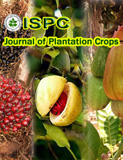Microbial insight into rhizosphere of arecanut palms of Wayanad using metagenomics
DOI:
https://doi.org/10.25081/jpc.2019.v47.i3.6055Abstract
The rhizosphere bacterial diversity of a plant is considered to play an essential role in mediating plant as well as soil health. An attempt to explore the bacterial diversity in the rhizosphere of arecanut palms in Wayanad was done to obtain an understanding of dominant bacterial phylotypes and the status of nutrient concentrations in rhizosphere soil and plants. Since arecanut production in Wayanad is facing a decline, a study to understand the rhizosphere conditions of healthy palms essentially provided insight into what strategies needed to be adopted for improvement of arecanut cultivation. The nutrient imbalance involving increased iron in soil and deficiencies of calcium, magnesium, zinc, and boron in the Arecanut rhizosphere was found to be an evident reason for the decline in production. Apart from that, the biological activities in the rhizosphere by the diversity of microorganisms were studied to understand the dominant bacterial phyla and genera present in the Arecanut rhizosphere. The presence of various important bacterial phyla like Proteobacteria, Actinobacteria, Acidobacteria, Firmicutes, and Bacteroidetes revealed the presence of various beneficial soil microorganisms and emphasized the need to enhance or augment the population of native microflora for efficient nutrient cycling by increasing the organic content of the soil. Since organic carbon is an essential requirement to support bacterial diversity, proper management practice that encompasses organic carbon amendment along with proper nutritional management could enhance bacterial diversity as well as health of the arecanut palms. The study indicated that the dominant bacterial phyla contained various beneficial microorganisms that can be exploited for improving nutrient recycling in the arecanut rhizosphere.







 .
.